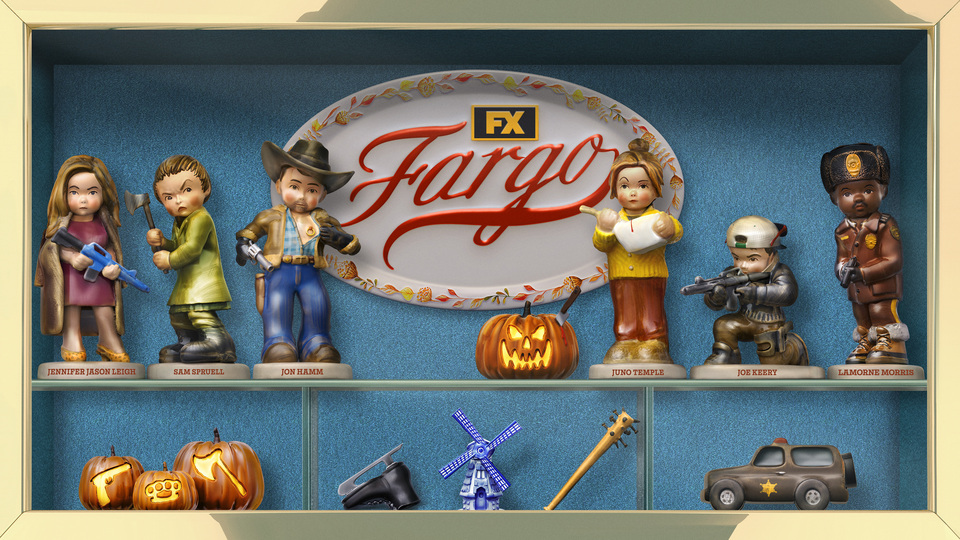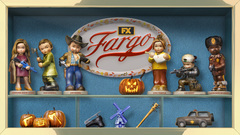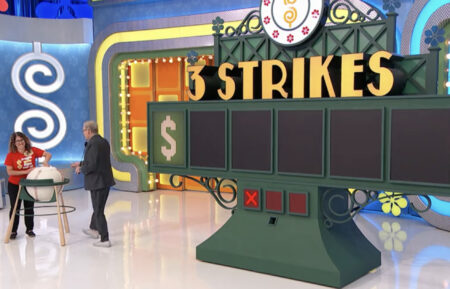‘Fargo’ Creator Noah Hawley Explains Why Killing This Year 5 Character ‘Felt Necessary’
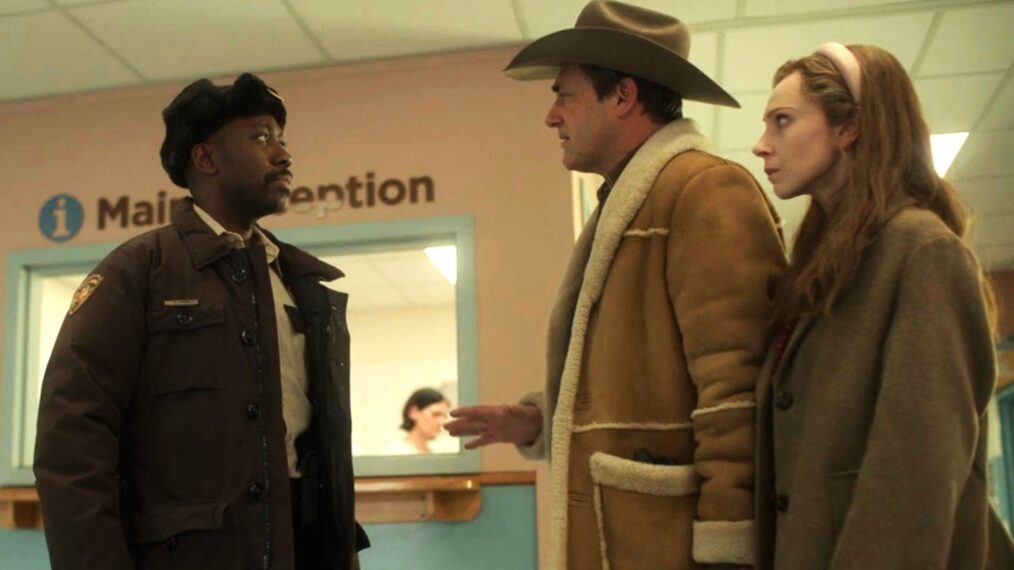
Emmys
This story contains discussions of domestic violence.
When it comes to Fargo, it’s always a delight to find out what story showrunner Noah Hawley has been cooking up for the FX drama, and Year 5 of the anthology was no exception.
Situated in 2019, this season tracks the story of Dot Lyon (Juno Temple), a secret survivor of domestic violence who is faced with her past as Nadine, the young bride of Jon Hamm‘s evil Roy Tillman who is determined to reclaim the runaway. In the years since her escape from Tillman’s North Dakota ranch, Nadine became Dot, a Minnesota housewife to Wayne (David Rysdahl) and a mom to Scotty (Sienna King). When Dot is arrested during a scuffle at her daughter’s school, she’s entered into a system Sheriff Tillman is able to access, sparking a dangerous game of cat and mouse all season long.
Along the way, Dot is aided by kind individuals like Deputy Witt Farr (Lamorne Morris) who feels he owes a debt to Dot after she saves his life in a gas station shootout. While Dot manages to get away from her abuser with help, Witt pays his debt by running after a fleeing Roy, only to wind up stabbed to death. As Dot mourns the loss of her friend, one threat comes knocking on her door a year after the events that occur at Tillman Ranch, as sin-eater Ole Munch (Sam Spruell) seeks repayment for injuries he suffered at Dot’s hands as her paid captor, employed by Roy. Ultimately, it is a biscuit and kindness that turns the pessimistic being’s mind around, allowing for forgiveness.
Below, creator Hawley opens up about why casting Juno Temple made Dot’s character work, why Witt needed to die, and how “Bisquik” became a supporting star.
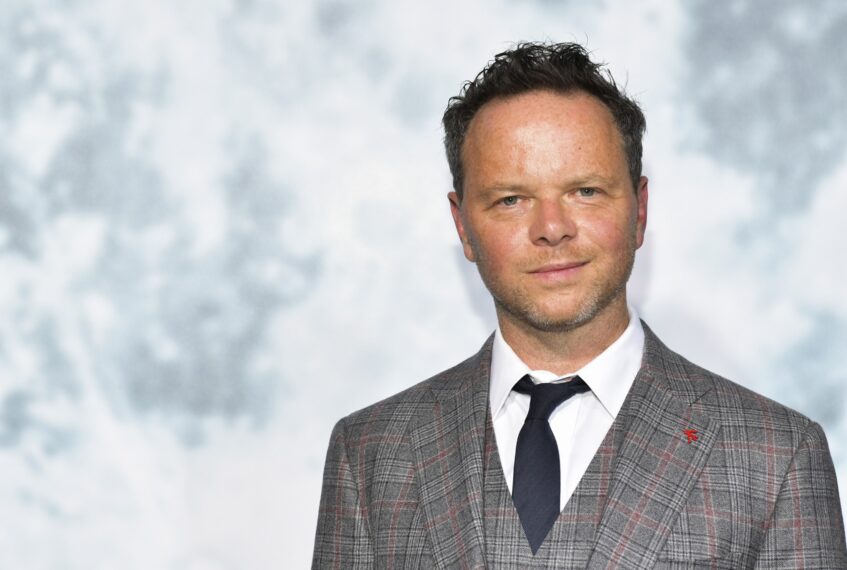
Rodin Eckenroth/Getty Images
You’ve mentioned before that you were inspired to write Dot’s story based on your own proximity to domestic violence survivors growing up. Does that aspect of Year 5 make Fargo‘s latest Emmy nominations even more special?
Noah Hawley: I never expect that people are going to watch it or that it’s going to resonate culturally. It feels like that would be arrogant to assume just because I want to make it, people want to watch it. So it’s very gratifying 10 years into this journey that we can still tell a story that is appointment television for people, where the craftsmanship is recognized. And it’s always a good gig for an actor and part of why is because they get recognized for their work.
Speaking of casting, what made Juno Temple the perfect Dot Lyon in your mind?
Well, I think if you miscast this role, then the audience just wants to call family services on her because on paper, she’s a bad mom, she has been kidnapped, she’s escaped, and then she pretends that it never happened. She knows they’re going to come back for her. She doesn’t alert her family, she just starts stripping electrical cables and putting them on the windows, making her house less safe. And so if she doesn’t have this sort of mischievous fun mom quality, then it’s going to seem like mental illness. So you have to be able to walk that line between the classic Fargo character in denial, which is manic. But then also my takeaway in the show is that she’s teaching her daughter to be prepared, but not afraid, which I think is a critical part of why the show resonated with so many people. This woman had these terrible things happen to her. She never gave up. She’s always going to outsmart them and she’s going to teach her daughter to do the same without teaching her that she needs to be afraid of the world.
In the finale’s closing shot, Ole Munch is seen taking a bite out of his “Bisquik” biscuit. What made him a compelling character to frame the season’s message of debt forgiveness and why use that brand as a full-circle element?
It’s just the brands of our lives in the middle of the country. If you’re saying it’s a true story, you don’t want to have to make up brand names. You want to live in the real world with people. And who has time? If you’re a working mom with two jobs and you still want to make pancakes, but you can’t start from scratch, there’s no pretension there. [Do] has her way [of boosting] the recipe a little bit to make it more personal for her daughter.
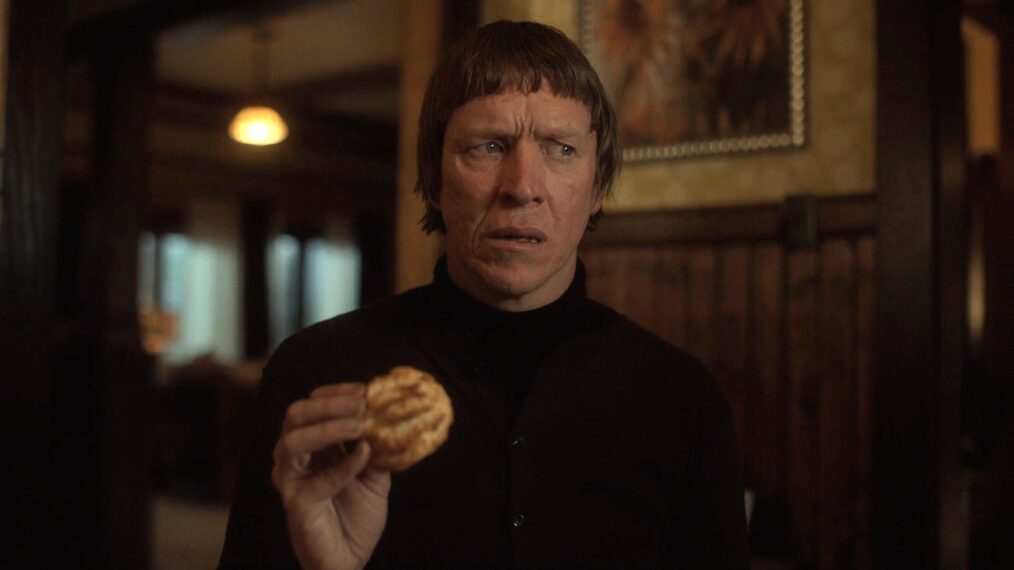
(Credit: FX)
In that scene where Dot comes home and Munch is there waiting for her, I didn’t know how it was going to go. I sort of thought it’s just going to be this scene where [Dot has] to outsmart the bad guy. And I thought, well, that’s his scene. What if she refuses to be his scene? What if she’s like, “You have to be in my scene, and in my scene, it’s halfway to dinner and it’s a school night, so wash your hands and help.” That instantly made it more interesting to me and allowed us to confront the underlying trauma that made Munch the person he is because so much of the season is about “How do we recover from the trauma that we’ve suffered?” And Fargo, from the movie to the show, there’s always a character who is in denial, whether it’s Bill Macy, Martin Freeman, or Kirsten Dunst, and that level of denial always destroys the people’s lives around them.
Bill Macy’s wife is murdered, his son is an orphan at the end of it, and Kirsten ends up with Jesse Plemons dead and she’s going to prison. And I thought, well, this year we got to do it differently because we want to have a happy ever after. But if Dot’s going to have that, she’s got to confront what she’s in denial about, which is why we did the “Linda” episode and the puppet show. And that allowed her to really come to terms with what she’d suffered and allowed her to be generous to Munch at the end of the show to say, I know what that feels like, and there is a path to forgiveness.
On the subject of Dot facing her traumas and moving forward, was killing Witt Farr part of that journey to living her life more honestly?
I feel in telling stories that I’m saying are true, the good guy doesn’t always win and the bad guy doesn’t always get punished. And it felt like as we reached this end game in which you had a literal siege where a shootout was going to take place, and the idea that the law enforcement officers would emerge unscathed wasn’t realistic. I suppose the choice could have been one of our two FBI agents, but the audience was as invested in them. And Witt is the guy when you talk about death, who felt like he owed his life because Dot saved him in that first hour and he was going to do whatever he could to pay her back.
I always talk about Fargo as a tragedy with a happy ending, but the tragedy has to be real. And that moment where Dot shoots Roy but doesn’t finish him, the audience knows if you don’t finish that guy, something awful is going to happen. And so it’s played as a tragedy from that point on. I didn’t choose suspense. I chose this feeling of dread of like, “Okay, he’s out there, he’s dangerous, and here goes Witt after him.” Probably what Witt should have done the moment he turned around and saw Roy there with a knife, is just to put a couple of bullets in him and call it self-defense, but he believed in justice and law and punishment. And the problem is that Roy doesn’t believe in any of those rules. And if you’re trying to follow the rules and you’re going up against someone who doesn’t, there’s a real danger that you’re going to get yourself killed. So it was a hard thing to do, but in the end, it felt necessary.
FX’s Fargo, Year 5, Streaming now, Hulu
If you or someone you know is the victim of domestic abuse, contact the National Domestic Violence Hotline at 1−800−799−7233.

